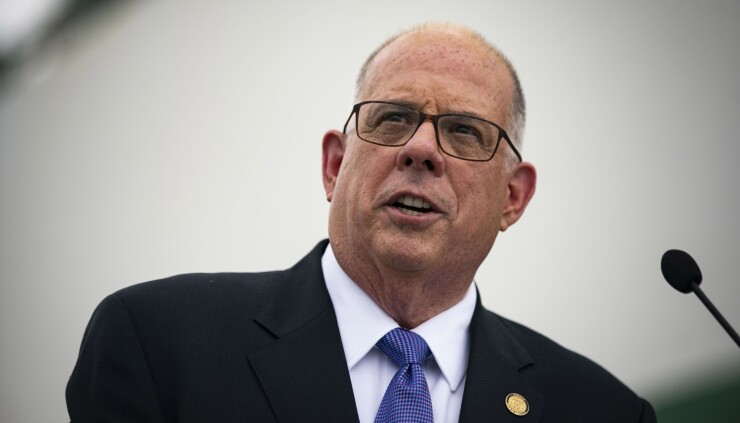Outgoing Maryland Gov. Larry Hogan's signature public-private partnership to build toll lanes on the Capital Beltway stalled this month when federal officials delayed a key decision needed to advance the project.
The clock is ticking for Hogan, who wants to lock down the roughly $9 billion project to add four high occupancy toll lanes to I-495 and I-270 before he leaves office in January. Called Op Lanes Maryland, the lanes would link to Virginia's HOT lanes and would be delivered as a 50-year design-build-finance-operate-and/or-maintain P3.
The Federal Highway Administration delayed issuing a so-called record of decision on the project's final environmental impact statement past Aug. 5, a date that's
Hogan criticized the delay in an

"If action is not taken to immediately rectify this improper decision, we are prepared to use every tool at our disposal – up to and including legal action," the governor warned. Hogan said the project's price tag has gone up by 20% after "two years of unwarranted federal delays."
It's the latest setback for the project, which has been dogged by local opposition. In February, a judge
It's unclear whether the two main gubernatorial candidates, Democrat Wes Moore and Republican Dan Cox, will support the project, as they have expressed reservations in the past, according to local reports.
The Hogan administration has said it planned to ask the state's Board of Public Works this fall to approve the P3, which would allow it to enter into the 50-year lease with the private consortium called Accelerate Maryland Partners that is led by Australian firms Transurban and Macquarie Infrastructure.
A spokesperson for Hogan said there are no updates since the federal delay. "We are still in discussions with the Federal Highway Administration," the spokesperson said.
The FHWA did not respond to a request for comment.
A spokesperson for Op Lanes Maryland said the Maryland Department of Transportation's State Highway Administration and the FHWA "continue to discuss the Record of Decision," and that "there is no timeline for a decision."
The dispute has garnered attention in the P3 industry.
The federal delay threatens to derail a P3 that gives the state access to an estimated $3 billion to $4 billion in private investment, David Winstead, a former Maryland Secretary of Transportation and founding chair of the Urban Land Institute's Public Development and Infrastructure Council, wrote in an
"At some point, private investors may conclude Maryland is just too difficult a place to do business and choose to invest their infrastructure dollars elsewhere," Winstead said.
The FHWA's delay may stem from local opposition and signals its reluctance to approve major highway expansion projects, said Baruch Feigenbaum, senior managing director of transportation policy at Reason Foundation, writing in an August 12 Surface Transportation News newsletter.
"The current FHWA has seemed to be hostile toward highway projects that add lanes. It blocked the planned reconstruction of I-45 in Houston, for example," he wrote. "Let's hope FHWA won't allow itself to be used as a political tool for NIMBYists."
Pollack has taken flak from state transportation officials and Republicans since





